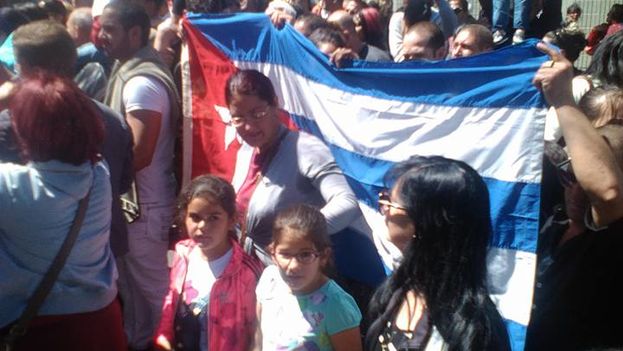
![]() 14ymedio, Rolando Gallardo, Quito, 14 December 2016 — I wake up and I see a report on the arrival of a group rafters on the coast of Miami. I’m surprised by the open declaration of one of them, who confesses having left Cuba in search of a better future, but says he has nothing against Fidel Castro. His words set me to meditating.
14ymedio, Rolando Gallardo, Quito, 14 December 2016 — I wake up and I see a report on the arrival of a group rafters on the coast of Miami. I’m surprised by the open declaration of one of them, who confesses having left Cuba in search of a better future, but says he has nothing against Fidel Castro. His words set me to meditating.
The Cuban Adjustment Act is a good deed on the way to hell. Thousands of Cubans arrive in the United States every year to take advantage of its benefits. Its repeal is a taboo subject among the exile and the emigration. Those who say they are in favor of its elimination or reform from abroad, receive avalanches of criticism and support, demonstrating the division of opinions about it.
The government of the island ascribes to the Cuban Adjustment Act the main reason for the exodus, dismissing internal conditions and policies that cause people to leave, this being a long-time strategy of the regime: Someone else is always to blame.
Authorized voices within the Cuban-American political establishment, such as Senator Marco Rubio, call for a revision of the Cuban Adjustment Act on the basis that not all Cubans arriving in the United States and claiming refuge under it meet the conditions to apply for asylum, and many of them demonstrate their political apathy by returning to the island as soon as they obtain a US residence permit, discrediting their supposed condition as a politically persecuted person.
Since the beginning of the most recent migration crisis in November of 2015, the division among Cubans stranded in Costa Rica and Panama is evident.
One group reaffirms, recklessly and motivated by an ignorance of the nature of the Adjustment Act, that they are economic migrants, which strengthens the arguments of the regime about the causes of illegal immigration.
Others, however, say that they left Cuba because of its repressive policies, lack of political and economic freedoms, and the impoverishment of the country, something imposed by an internal blockade that has plunged the Cuban people into despair.
Both sides agree that this mass escape was motivated by the fear of political transformations that would be generated by the “thaw,” leaving them inside a nation that sees no long-term changes in the relationship between the government and the people.
It is legitimate to question whether the Cuban Adjustment Act should continue under the current terms. The receiving government spends an annual average of 500 million dollars in aid to the “Cuban refugees.” Some estimates indicate that, from 2014 to late 2016, the United States has allocated 1.5 billion dollars for monetary aid for the first six months, food stamps for three months which are renewable for longer, health insurance for ten months for adults and more health insurance assistance for children, as well as supplementary services for the elderly.
Does every Cuban deserve such kindness? The final saga of the migratory crisis, which has had its most recent and dire chapter in Ecuador, demonstrated that some members of the regime are parasites benefitting from the Cuban Adjustment Act. They waste no time in leaving behind the claws of the tiger, and brazenly appear among the voices clamoring for an airlift to continue their journey to the United States, while in Cuba they were persecutors of the Ladies in White, Cuban counterintelligence officials, members of the National Assembly of People’s Power, and militant communist/opportunists who, tired of the perks of the regime, head north to take advantage of other perks in “la Yuma” – the United States. Many of them, who denied there was a political motive to this breakout, are now in the United States enjoying government help.
Another group, misunderstood and attacked, launched itself in courageous though reckless protest against the Cuban embassy in Quito, showing the political nature of the exodus and starring in one of the never before seen historic feats of the emigration. Unfortunately, it is an event little spoken of. Many of the protesters were deported to Cuba. Another group of people and protagonists of the protest camp in Quito’s Arbolito Park are already in the United States, justifying with their actions and political stance that they deserve the benefits of the Cuban Adjustment Act.
I support reform of the terms of the Cuban Adjustment Act. It is not fair that the American taxpayers’ money goes into the hands of those who enjoyed communism and now want to enjoy capitalism without deserving to. It is not fair that economic emigrants and future speculators head back to the island with their recently obtained residence permits, trampling on the spirit that gave rise to the law. Those who are unscrupulous and reject with their behavior – far from that of the politically persecuted – the refuge offered to them, should have their status reassessed.
I do not live in the United States and I have not benefited from the Cuban Adjustment Act, nor do I consider myself politically persecuted, despite my actions and opinions, but I condemn those who mock the law and discredit the support and sustenance that the United States government has offered to our people in the hard years of the exodus, which sadly does not end.
